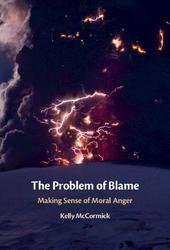
|
The Problem of Blame: Making Sense of Moral Anger
Hardback
Main Details
| Title |
The Problem of Blame: Making Sense of Moral Anger
|
| Authors and Contributors |
By (author) Kelly McCormick
|
| Physical Properties |
| Format:Hardback | | Pages:256 | | Dimensions(mm): Height 235,Width 157 |
|
| Category/Genre | Philosophy - metaphysics and ontology
Ethics and moral philosophy |
|---|
| ISBN/Barcode |
9781108842259
|
| Classifications | Dewey:158.2 |
|---|
| Audience | | Tertiary Education (US: College) | |
|---|
| Illustrations |
Worked examples or Exercises; Worked examples or Exercises
|
|
Publishing Details |
| Publisher |
Cambridge University Press
|
| Imprint |
Cambridge University Press
|
| Publication Date |
5 May 2022 |
| Publication Country |
United Kingdom
|
Description
This book makes a case for the permissibility of reactive blame - the angry, harmful variety. Blame is a thorny philosophical problem, as it is notoriously difficult to specify the conditions under which an agent is deserving of blame, is deserving of blame in the basic sense, and furthermore why this is so. Kelly McCormick argues that sharpening the focus to reactive, angry blame can both show us how best to characterize the problem itself, and suggest a possible solution to it, because even reactive blame is both valuable and deserved in the basic sense. Finally, McCormick shows how, despite the many facets of the dark side of blame, adopting an explicitly victim-centered approach highlights a powerful argument from empathy for retaining reactive blame and its attendant attitudes and practices.
Author Biography
Kelly McCormick is Associate Professor of Philosophy at Texas Christian University. She has published a number of articles on blame, desert, and moral responsibility in journals including Philosophical Studies, The Journal of Value Inquiry, and The Journal of Ethics & Social Philosophy.
Reviews'This is an innovative book that tackles first-order questions about what makes angry blame deserved as well as methodological questions about the concept of moral responsibility. McCormick doesn't shy away from the hard questions, and theorists of all stripes will learn from her framework, even when they disagree with it.' Neal Tognazzini, Western Washington University
|